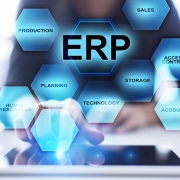4 Ways Cloud-Native ERP Solutions Differ From Cloud-Hosted Solutions
With the increasingly rapid growth of cloud the cloud platform for end-user technology, especially in enterprise resource planning (ERP), there may be some confusion whether or not a company’s system is cloud-native or simply just cloud hosted. And yes, there is a difference. Simply put, cloud-native applications are created in the cloud, utilizing the full power of cloud architecture to transcend traditional application restrictions. Cloud-hosted applications are traditional applications that have been migrated to the cloud and are not designed to take full advantage of the cloud. So, which one does your organization have and which is better to use? distinguish cloud-hosted ERP solutions from cloud-native ones. there are some common characteristics you should observe, but still major differences. Cloud-native ERP systems should have these (and maybe more) features:
- Serverless Design. “These technologies are serverless. The customer does not need a server, and the technology runs in a public cloud. I think the best of them have dual-use rights (so you can also choose to run them on your own infrastructure). These systems use single sign-on through Google, Microsoft, Facebook etc. Customers usually pay through a monthly subscription model, but that defines its economics, not the technology.”
- Cloud Native Technology is Device Agnostic. “Any cloud-native technology is, by its nature, device agnostic. A cloud-native ERP system runs on any hardware platform and any operating system. Even Microsoft’s Dynamics 365 ERP systems (Business Central and Finance and Operations) can run on a Mac, a Chromebook, a Pixel, or Android Phone. They speak “swipe and pinch” and recognize Bluetooth printers. They have native apps in all the major app stores.”
- Cloud-Native is App Friendly. “Whether it is Salesforce, Netsuite, the Microsoft Dynamics 365 product line, or any other cloud-native line-of-business system, they all support some private app store. The design of these technologies is open and easily integrated. It’s the design philosophy that exploded the use of the iPhone and buried Blackberry.”
- Rapid Deployment. “Speaking as someone who spent years selling Dynamics NAV (now in the cloud as Dynamics 365 Business Central), cloud-native ERP is deployed with virtually zero effort. The onboarding effort is more limited by customers submitting payment methods than any technical element. Old ERP systems could take weeks or months to get hardware in place and software installed. Cloud-native systems can come online by the end of a phone call.”



Leave a Reply
Want to join the discussion?Feel free to contribute!